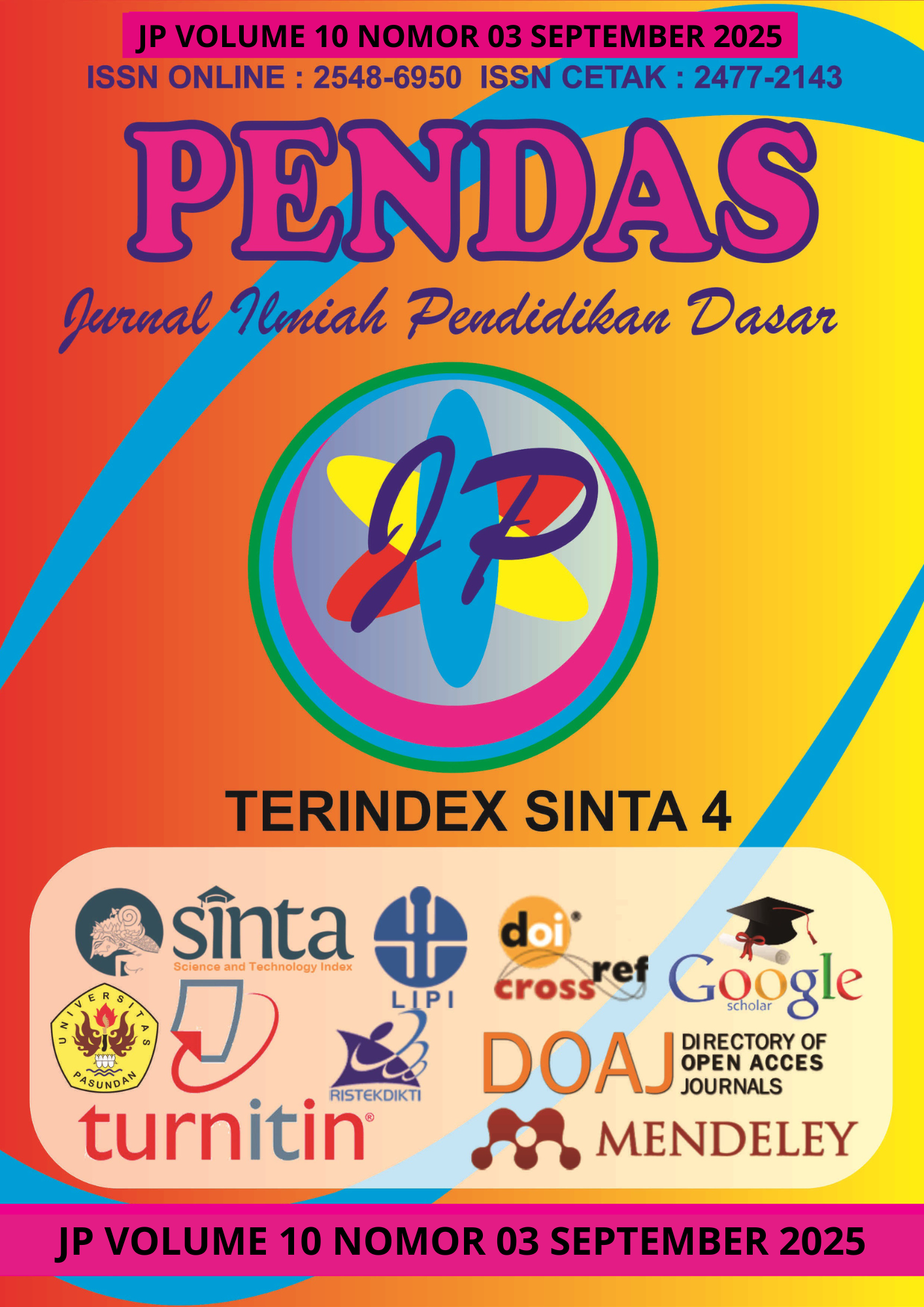PENERAPAN MODEL PROBLEM BASED LEARNING UNTUK MENINGKATKAN HASIL BELAJAR MATEMATIKA MATERI BANGUN DATAR KELAS II UPT SD NEGERI DOROMUKTI
DOI:
https://doi.org/10.23969/jp.v10i3.29221Keywords:
learning outcomes, mathematics, problem based learningAbstract
The purpose of this research is to determine the implementation of the Problem-Based Learning model to improve math learning outcomes on the topic of flat shapes for second-grade students at UPT SD Negeri Doromukti. The applied approach is Classroom Action Research (CAR) using the Kemmis and McTaggart model implemented in 2 cycles. Each cycle involves four main stages: planning, action, observation, and reflection. The research targets include second-grade students at UPT SD Negeri Doromukti, and the information collection process is carried out using observation and test techniques. Based on preliminary observations, it is known that the teacher still predominantly uses the lecture method. The data obtained show that the implementation of the Problem-Based Learning model can improve learning outcomes. This is evidenced in cycle 1, where 8 students reached the Minimum Passing Criteria (KKTP) with an average score of 70, followed by cycle 2, where there was an increase with 10 students meeting the KKTP with an average score of 80, thus it can be concluded that the desired target has been achieved, which is a minimum average score of 75.
Downloads
References
Amalia, I., Muhajang, T., & Hikmah, N. (2023). Pengaruh Penerapan Model Problem Based Learning Terhadap Hasil Belajar Subtema Bangga Terhadap Daerah Tempat Tinggalku. Jurnal Ilmiah Pendidikan Guru Sekolah Dasar, 9(2), 2721–2729. https://doi.org/10.36989/didaktik.v9i2.953
Ardianti, R., Sujarwanto, E., & Surahman, E. (2021). DIFFRACTION: Journal for Physics Education and Applied Physics Problem-based Learning: Apa dan Bagaimana. DIFFRACTION: Journal for Physics Education and Applied Physics, 3(1), 27–35. http://jurnal.unsil.ac.id/index.php/Diffraction
Ariyani, B., & Kristin, F. (2021). Model Pembelajaran Problem Based Learning untuk Meningkatkan Hasil Belajar IPS Siswa SD. Jurnal Imiah Pendidikan Dan Pembelajaran, 5(3), 353. https://doi.org/10.23887/jipp.v5i3.36230
Aryanthi, K. D., Suwatra, I. I. W., & Suarjana, I. M. (2019). Pengaruh Model Pembelajaran Air Berbantuan Media Gambar Terhadap Hasil Belajar Ips Siswa. Media Komunikasi FPIPS, 17(1), 33–43. https://doi.org/10.23887/mkfis.v17i1.22215
Hanum, U. L., Masturi, & Khamdun. (2022). Pola Asuh Orang Tua Terhadap Motivasi Belajar Anak Sekolah Dasar Di Desa Bandungrejo Kalinyamatan Jepara. 2(8), 2443–2450.
Husnidar, & Hayat, R. (2021). Penerapan Model Pembelajaran Problem Based Learning Untuk Meningkatkan Hasil Belajar Matematika Siswa. ASIMETRIS: Jurnal Pendidikan Matematika Dan Sains, 1(2), 43–49.
Makinem. (2015). Pengelolaan Pembelajaran Matematika Model Paikem. Manajer Pendidikan, 9(5), 709–714.
Mudlofi, A., & Rusyidiyah, E. F. (2016). Desain Pembelajaran Inovatif Teori dan Praktik. Rajawali Pers.
Noviati, W. (2022). Penerapan Model Pembelajaran Problem Based Learning (PBL) Dalam Meningkatkan Hasil Belajar IPA DI SD. Jurnal Kependidikan, 7(2), 19–27. file:///C:/Users/ASUS/Downloads/1097-Article Text-3401-1-10-20230117.pdf
Pujiati, P. (2022). Penerapan Model Pembelajaran Problem Based Learning Untuk Meningkatkan Hasil Belajar Matematika Topik Aritmetika Sosial. Pedagogia: Jurnal Ilmiah Pendidikan, 14(1), 1–6. https://doi.org/10.55215/pedagogia.v14i1.4787
Rahmatillah, W., Jayatri, T., Isnata, R., & Wulandari, S. (2025). Penerapan Model PJBL Terhadap Keaktifan Belajar Siswa Mata Pelajaran IPAS Kelas 6 SDN. 1, 15–21.
Susanti, Y. (2020). Pembelajaran Matematika dengan Menggunakan Media Berhitung di Sekolah Dasar dalam Meningkatkan Pemahaman Siswa. EDISI : Jurnal Edukasi Dan Sains, 2(3), 435–448. https://ejournal.stitpn.ac.id/index.php/edisi
Utami, A. R., Suhendri, & Dian, P. (2019). Hubungan Kreativitas Guru dengan Hasil Belajar Siswa. Bimbingan Dan Konseling Indonesia, 04(2), 56–62.
Utomo, P., Asvio, N., & Prayogi, F. (2024). Metode Penelitian Tindakan Kelas (PTK): Panduan Praktis untuk Guru dan Mahasiswa di Institusi Pendidikan. Pubmedia Jurnal Penelitian Tindakan Kelas Indonesia, 1(4), 19. https://doi.org/10.47134/ptk.v1i4.821
Yandi, A., Nathania Kani Putri, A., & Syaza Kani Putri, Y. (2023). Faktor-Faktor Yang Mempengarui Hasil Belajar Peserta Didik (Literature Review). Jurnal Pendidikan Siber Nusantara, 1(1), 13–24. https://doi.org/10.38035/jpsn.v1i1.14
Zaini, M., Noorthaibah, N., & Julaiha, S. (2023). Pendidik Dalam Perspektif Iimam Al Ghazali Dan Relevansinya Di Era Society 5.0. EDUSAINTEK: Jurnal Pendidikan, Sains Dan Teknologi, 11(1), 174–193. https://doi.org/10.47668/edusaintek.v11i1.1001
Downloads
Published
Issue
Section
License
Copyright (c) 2025 Pendas : Jurnal Ilmiah Pendidikan Dasar

This work is licensed under a Creative Commons Attribution 4.0 International License.



















